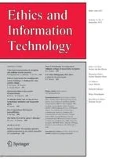Abstract
It has become quite common for people to develop `personal' relationships nowadays, exclusively via extensive correspondence across the Net. Friendships, even romantic love relationships, are apparently, flourishing. But what kind of relations really are possible in this way? In this paper, we focus on the case of close friendship. There are various important markers that identify a relationship as one of close friendship. One will have, for instance, strong affection for the other, a disposition to act for their well-being and a desire for shared experiences. Now obviously, while all these features of friendship can gain some expression through extensive correspondence on the Net, such expression is necessarily limited –you cannot, e.g., physically embrace the other, or go on a picnic together. The issue we want to address here however, is whether there might be distinctive and important influences on the structure of interaction undertaken on the Net, that affect the kind of identity ``Net-friends'' can develop in relation to one another. In the normal case, one develops a close friendship, and in doing so, one's identity, in part, is shaped by the friendship. To some extent, through extensive shared experience, one comes to see aspects of the world (and of oneself) through the eyes of one's friend and so, in part, one's identity develops in an importantly relational way, i.e., as the product of one's relation with the close friend. In our view, however, on account of the limits of, and/or the kind of, shared contact and experience one can have with another via correspondence on the Net, there are significant structural barriers to developing the sort of relational identity that is a feature of close friendship. In arguing our case here, and by using the case of Net ``friendship'' as our foil, we aim to shed light on the nature and importance of certain sorts of self-expression and relational interaction found in close friendship.
Similar content being viewed by others
Author information
Authors and Affiliations
Rights and permissions
About this article
Cite this article
Cocking, D., Matthews, S. Unreal Friends. Ethics and Information Technology 2, 223–231 (2000). https://doi.org/10.1023/A:1011414704851
Issue Date:
DOI: https://doi.org/10.1023/A:1011414704851




